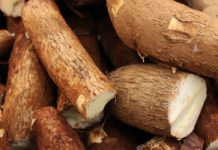Is Kola Nut Healthy?
Kola nut is a fruit of the kola tree and this tree grows in the tropical regions of West Africa and America. It is scientifically known as Cola acuminate and Cola nitida. The two main varieties of kola nuts are red and white kola. These two varieties are produced by the same plant species and can also grow on the same pod. The kola tree grows in Liberia, Niger, Brazil Sierra Leone, and Sri Lanka, among some other countries. It also thrives in humid climates in Nigeria. In Nigeria, it is considered an important cultural symbol for many ethnic groups. It is used as entertainment to guests at traditional weddings, funerals, naming ceremonies, and many other important events. The kola nut is about the size of a chestnut. It is often chewed as a natural stimulant and has a bitter taste, although it gives a sweet taste after chewing.
Composition of Kola Nut
Kola nuts contain compounds that are beneficial to one’s health. Let`s look at some of the compounds of kola nut:
- Catechins
- Tannins
- Caffeine; contains about two to three percent of it
- Theobromine; one to two percent of it
Kola nut also has the highest moisture, crude fat, and crude fiber contents of 66, 5.71, and 7.13% respectively. It also contains some micronutrients such as:
- Potassium
- Magnesium
- Calcium
- Antioxidants
Uses of Kola Nut
- It is used as a flavoring agent in the Western world.
- This kola nut is chewed during ceremonies and rituals in some parts of West Africa.
- It can serve as energy drinks and performance boosters. In some cases, it is used in the form of a powder.
- It is used as a medicine in some parts of the world. It is either boiled to extract the juice or crushed into a powder, to get the full result.
- The powder form of seeds can be used to treat diarrhea.
Health Benefits of Kola Nut
There are numerous benefits of kola nut, some of which are treating fatigue, easing hunger sweetening stale water, and aiding digestion, among many other benefits such as:
- Treatment of infections
- Easing difficult labor
- Curing depression
- Combatting low sex drive
- Curing dysentery
- Treating constipation
- Dealing with ulcers
- Treats respiratory issues
- Helps regulate one’s menstrual cycle
- Treats headaches
- Treats different skin diseases
- Eases morning sickness
- Helps boost one’s mental health
- Relieves toothaches and sore gums
Let us discuss in detail, some of these benefits.
Regulates Blood Pressure
 A study has shown that the diuretics present in kola nuts help treat congestive heart failure, hypertension, and nephritis, and pregnancy toxemia. It also helps increase the excretion of urine without causing electrolyte imbalance or any other damage to the liver and kidney.
A study has shown that the diuretics present in kola nuts help treat congestive heart failure, hypertension, and nephritis, and pregnancy toxemia. It also helps increase the excretion of urine without causing electrolyte imbalance or any other damage to the liver and kidney.
Aids Digestion
The kola nut powder and extract help aid digestion. They promote the production of gastric acid which increases digestive enzyme effectiveness in the stomach.
Boosts Energy Level
The caffeine in the kola nut naturally stimulates the central nervous system, which in turn, increases alertness and boosts one’s energy level.
Boosts Circulation
Caffeine and theobromine in kola nut may help speed up one’s heart rate, thereby increasing circulation.
Aids Weight Loss
The extracts of kola nuts have been connected with increased fat-burning in the body, due to the positive impact that these nuts have on metabolism.
Boosts Metabolism
Conditions like low testosterone, Graves’ disease, and Cushing syndrome may affect one’s metabolism. One can benefit from using products that contain kola nut to help boost their metabolism.
Treats Asthma
Although it may not be recommended as a treatment for respiratory conditions, it may be useful for people with breathing problems such as asthma. The caffeine in kola nuts may act as an inhaler which helps open up the airways for breathing to be easier.
Hair Benefits of Kola Nut
Treats Hair Loss and Prevents Infections
Hair loss is common among the female and male gender and is considered a major problem. In males, it is due to the effects of the male hormone, dihydrotestosterone (DHT), which affects one’s hair follicles. Over time, these follicles become smaller and result in baldness when they finally disappear. When one applies the caffeine in kola nut to the hair, it penetrates the roots and helps stimulate it. Caffeine also stimulates the hair roots in the scalps of women and activates stronger hair growth. Antioxidants present in kola nut also help stimulate healthy hair production. The antibacterial properties in kola nut can soothe one’s scalp and relieve them of any irritation, itches, and infections.
Reduces Cellulite
Cellulite is the buildup of fat underneath one’s skin. Dried crushed kola nut contains fat-burning properties that help reduce cellulite. The caffeine present in kola nuts can help dehydrate fatty cells. It will help minimize the appearance of cellulite on the skin, therefore, providing you with a smooth and healthy scalp.
5 Side Effects of Kola Nut
As much as kola nut has its health benefits, there are also side effects. The main active component of kola nut is caffeine, which is a nervous system stimulant and a diuretic. It increases stomach acid production which leads to heartburn if consumed in large quantities. It also interferes with the body’s ability to absorb calcium and increases blood pressure. Here are some other side effects of kola nut:
Birth Defects
Kola nut is associated with birth defects, so pregnant women are advised to reduce their intake of kola nuts.
Existing Medical Conditions
People with any existing medical condition are advised to avoid the intake of kola nut or any product that contains the fruit.
Insomnia
 People with sleeping disorders are advised to reduce their intake of stimulants that contain caffeine because such products can cause difficulty falling asleep.
People with sleeping disorders are advised to reduce their intake of stimulants that contain caffeine because such products can cause difficulty falling asleep.
Shakiness
The intake of kola nut can lead to tremors, shakiness, and anxiety because it can affect the central nervous system. People with anxiety problems are prone to shakiness from consuming kola nut.
Nausea
Excessive consumption of kola nuts can lead to stomach upset, restlessness, headaches, dizziness, dehydration, among other conditions.
Some Caffeine Facts
- Caffeine sensitivity is genetic.
- Unknown to many caffeine neither originated through coffee nor tea. It first came through chocolate from South America, which was carried by the Spaniards across the Atlantic.
- Studies show that women metabolize caffeine about 25% faster than men.
- Research shows that Asians metabolize caffeine slower than Caucasians.
- Moderate caffeine consumption is 200–300 mg per day. Doses that are higher than 500–600 mg are heavy and may cause irritability, insomnia, and a fast heart rate.
- Dark roasted coffees contain less caffeine than lighter roasts because the process of roasting burns off the caffeine.
- Coffee has three times more caffeine than tea or cola.
- 90% of adults all over the world consume caffeine in one form or another.
- Finland consumes more caffeine than any other country in the world. Following Finland are Sweden, Denmark, Norway, Belgium, the Netherlands, Germany, Austria, Switzerland, and France.
Now that you Know…
Kola nuts are beneficial in various ways, and the extracts are considered safe by the FDA and other governing bodies worldwide. Consumers are advised to take with caution, as it contains caffeine which can be dangerous to one’s health when consumed in high quantities. As much as possible, consume kola nuts in moderate proportions for your health`s safety.




